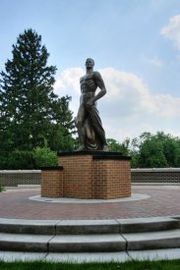Michigan State University
| Michigan State University | |
|---|---|
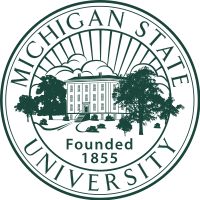 |
|
| Motto | Advancing Knowledge. Transforming Lives. |
| Established | February 12, 1855 |
| Type | Flagship Public Land grant Sea grant |
| Endowment | US $1.05 billion[1] |
| President | Dr. Lou Anna Simon |
| Academic staff | 4,985[2] |
| Admin. staff | 6,355[2] |
| Students | 47,278[3] |
| Undergraduates | 36,489[2] |
| Postgraduates | 10,789[2] |
| Location | East Lansing, Michigan, USA |
| Campus | Suburban (21 km2) campus 10,000 acres (8 km2) in existing or planned development |
| Colors | |
| Sports | Spartans |
| Mascot | Sparty |
| Website | www.msu.edu |
 |
|
Michigan State University (MSU) is a public research university in East Lansing, Michigan USA. Founded in 1855, it was the pioneer land-grant institution and served as a model for future land-grant colleges in the United States under the 1862 Morrill Act. Its alumni include at least six winners of the Pulitzer Prize. MSU’s record of Rhodes Scholars has led the Big Ten since the 1970s. MSU pioneered the studies of packaging, hospitality business, telecommunication, and music therapy. Today its study-abroad program is the largest of any single-campus university in the country, offering more than 200 programs in more than 60 countries on all continents including Antarctica. It is considered to be one of America's Public Ivy universities, which recognizes top public research universities in the United States.[5]
Following the introduction of the Morrill Act, the college became coeducational and expanded its curriculum beyond agriculture. After World War II, the number of students tripled as the institution became a major university. Today, MSU is the eighth-largest university in the United States, with 47,100 students and 2,954 faculty members.
MSU's Division I sports teams are called the Spartans. They compete in the Big Ten Conference in all sports except ice hockey, in which the team is part of the Central Collegiate Hockey Association. MSU's football team won the Rose Bowl in 1954, 1956, and 1988 and boasts six national championships.[6] Its men's basketball team won the NCAA National Championship in 1979 and 2000 while currently enjoying a streak of six Final Four appearances in the last 12 seasons. MSU men's ice hockey has won national titles in 1966, 1986, and 2007. Cross Country has historically been Michigan State's most successful sport; especially during a four-decade period spanning roughly 1930-1970 during which the Spartans won eight NCAA championships and numerous other conference and national titles.[7]
Contents |
History
Agriculture school
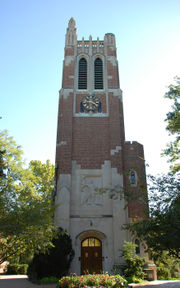
The Michigan Constitution of 1850 called for the creation of an "agricultural school",[8] though it was not until February 12, 1855 that Michigan Governor Kinsley S. Bingham signed a bill establishing the United States' first agriculture college, the Agricultural College of the State of Michigan.[9] Classes began on May 13, 1857 with three buildings, five faculty members, and 63 male students. The first president, Joseph R. Williams, designed a curriculum that required more scientific study than practically any undergraduate institution of the era. It balanced science, liberal arts, and practical training. The curriculum excluded Latin and Greek studies, since most applicants did not study any classical languages in their rural high schools. However, it did require three hours of daily manual labor, which kept costs down for both the students and the College.[10] Despite Williams' innovations and his defense of education for the masses, the State Board of Education saw Williams' curriculum as elitist. They forced him to resign in 1859 and reduced the curriculum to a two-year vocational program.
Land Grant pioneer
In 1860, Joseph R. Williams became acting lieutenant governor[11] and helped pass the Reorganization Act of 1861. This gave the College a four-year curriculum and the power to grant master's degrees. Under the act, a newly created body, known as the State Board of Agriculture, took over from the State Board of Education in running the institution.[9] The College changed its name to State Agricultural College, and its first class graduated in the same year. However, there was no time for an elaborate graduation ceremony: the Civil War had just begun, and the first alumni enlisted to the Union Army. The following year, Abraham Lincoln signed the First Morrill Act of 1862 to support similar colleges, making the Michigan school a national model. Williams never witnessed the cause to which he had dedicated so much of his life, having taken ill and died the previous year.
Co-ed college

The college first admitted women in 1870, although at that time there were no female residence halls. The few women who enrolled either boarded with faculty families or made the arduous stagecoach trek from Lansing. Nonetheless, even from the early days female students took the same rigorous scientific agriculture courses as male students. In 1896, the faculty created a "Women Course" that melded a home economics curriculum with liberal arts and sciences. That same year, the College turned the old Abbot Hall male dorm into a women's dormitory and more firmly established itself as co-ed. However, it was not until 1899 that the State Agricultural College admitted its first African American student, William O. Thompson. He went on to teach at what is now Tuskegee University under the wing of Booker T. Washington, whom President Jonathan L. Snyder invited to be the Class of 1900 commencement speaker. A few years later, Myrtle Craig became the first female African American student to enroll at the College. Along with the Class of 1907, she received her degree from U.S. President Theodore Roosevelt, commencement speaker for the Semi-Centennial celebration. The City of East Lansing was incorporated in that same year,[12] and two years later the college officially changed its name to Michigan Agricultural College (M.A.C.).
Big Ten university
During the early 20th century, M.A.C. expanded its curriculum well beyond agriculture. By 1925 it had expanded enough that it changed its name to Michigan State College of Agriculture and Applied Science (M.S.C.). In 1941 the Secretary of the State Board of Agriculture, John A. Hannah, became president of the College. He began the largest expansion in the institution's history, with the help of the 1945 G.I. Bill, which helped World War II veterans to receive an education. One of Hannah's strategies was to build a new dormitory building, enroll enough students to fill it, and use the income to start construction on a new dormitory. Under his plan, enrollment increased from 15,000 in 1950 to 38,000 in 1965.[13] In 1957 Hannah continued MSU's expansion by co-founding Michigan State University–Oakland, now Oakland University, with Matilda Dodge Wilson. Hannah also got the chance to improve the athletic reputation of M.S.C. when the University of Chicago resigned from the Big Ten Conference in 1946. Hannah lobbied hard to take its place, gaining admission in 1949.[14] Six years later, in its Centennial year of 1955, the State of Michigan renamed the College as Michigan State University of Agriculture and Applied Science.[15] Nine years after that, the University governing body changed its name from the State Board of Agriculture to the MSU Board of Trustees. The State of Michigan[16] allowed the University to drop the words "Agriculture and Applied Science" from its name. Since 1964 the institution has gone by the name of Michigan State University.
Global leader by 2012
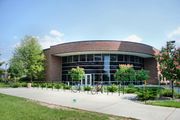
Since the end of the Hannah era, Michigan State has shifted its focus from increasing the size of its student body to advancing its national and global reputation. In September 2005, current president Lou Anna Simon called for MSU, one of the public ivy institutions, to become the global model leader for Land Grant institutions by the year 2012. Her plans include creating a new residential college and increasing grants awarded from the National Institutes of Health past the $100 million mark. While there are over 100 Land-grant universities in the United States, she has stated that she would like Michigan State University to be the leader.[18]
Michigan State recently joined the University of Michigan and Wayne State University to create the University Research Corridor. This effort was undertaken to highlight the capabilities of the state's three leading research institutions and drive further collaboration.
Campus

MSU's sprawling campus is located in East Lansing. The campus is perched on the banks of the Red Cedar River. Development of the campus started in 1856 with three buildings: a multipurpose building called College Hall, a dormitory later called "Saints' Rest",[19] and a barn. Today, MSU's contiguous campus consists of 5,200 acres (21 km2), 2,000 acres (8.1 km2) of which are developed. There are 556 buildings: 100 for academics, 131 for agriculture, 166 for housing and food service, and 42 for athletics. Overall, the university has 22,763,025 square feet (2,114,754.2 m2) of total indoor space.[20] Connecting it all is 26 miles (42 km) of roads and 100 miles (160 km) of sidewalks.[21] MSU also owns 44 non-campus properties, totaling 22,000 acres (89 km2) in 28 different counties.[22]
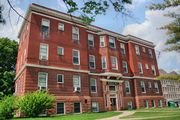
North campus
The oldest part of campus lies on the north bank of the Red Cedar. It includes Collegiate Gothic architecture, plentiful trees, and curving roads with few straight lines. It was in this area that the College built its first three buildings, of which none survive. Other historic buildings north of the river include Cowles House, the president's official residence, and Beaumont Tower, a carillon clock tower marking the site of College Hall, the original classroom building. To the east lies Eustace-Cole Hall, America's first freestanding laboratory for horticulture.[23] Other landmarks include the bronze statue of former president John A. Hannah,[24] the W. J. Beal Botanical Garden, and the painted boulder known as "The Rock", which is a popular spot for theatre, tailgating, and candlelight vigils. On the northwest corner of campus lies the University's hotel, the Kellogg Hotel and Conference Center. The university also has a museum, initiated in 1857. MSU Museum is one of the oldest museums in the Midwest and is accredited by the American Association of Museums.[25]
South campus
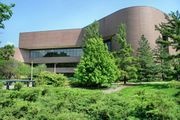
The campus south of the river consists mostly of post-World War II International Style buildings with sparse foliage, relatively straight roadways, and numerous parking lots. The "2020 Vision" Master Plan proposes replacing these parking lots with parking ramps and green space,[26] but these plans will take many years to reach fruition. As part of the master plan, the University erected a new bronze statue of "The Spartan" in 2005. This replica replaced the original modernist terra cotta statue,[27] which can still be seen inside Spartan Stadium. Notable academic and research buildings on the South Campus include the Cyclotron and the College of Law. This part of campus is home to the MSU Horticulture Gardens and the adjoining 4-H Children's Garden. South of the gardens lie the Canadian National and CSX railroads, which divide the main campus from thousands of acres of university-owned farmland. The university's agricultural facilities include the Horse, Dairy Cattle, Beef Cattle, Sheep, and Poultry Teaching and Research Farms, as well as the Air Quality Control Lab and the Diagnostics Center for Population and Animal Health.
Dubai Education Center
In 2008, Michigan State University established an education center in Dubai, United Arab Emirates. MSU Dubai was the first American university with a presence in DIAC-Dubai International Academic City, with classes beginning in August 2008. The University offered six undergraduate programs - Business Administration; Child and Youth Development; Construction Project Management; Early Childhood Education; Media Management and Research; Computer Engineering, which later was changed to Electrical and Computer Engineering; and a Master's Degree in Human Resources & Labor Relations. The University attracted over 100 students from all over the Middle East and beyond.[28] After two years of activity, MSU shut down all undergraduate programs in Dubai on July 6th, 2010, due to financial reasons. Office of International Students in Michigan State University offered all student enrolled by July 7th an opportunity to continue their education in the main campus, East Lansing. The Dubai campus remains as a research site, a Study Abroad center, and for its dozen graduate students.
Academics
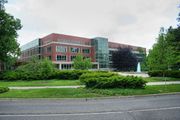
MSU has the eighth largest student body in the U.S. For the fiscal year of 2009-10, the Office of the Registrar conferred 11,140 degrees.[29] The student body is 55% female and 45% male. While 89% of students come from all 83 counties in the State of Michigan,[30] also represented are all 50 states in the U.S. and about 125 other countries.[2] MSU has about 4,500 faculty and 6,000 staff members, and a student/faculty ratio of 19:1.[31] Listed as a Public Ivy,[32] Michigan State is a member of the Association of American Universities. Michigan State University Ombudsman is the longest continually operating ombudsman office at a college or university in the country.[33] Albert Fert, an Adjunct professor at MSU, was awarded the 2007 Nobel Prize in Physics together with Peter Grünberg.[34] MSU's study abroad program is the largest of any single-campus university in the United States with 2,461 students studying abroad in 2004–2005 in over 60 countries on all continents, including Antarctica.[35] MSU has six faculty members elected to the National Academy of Sciences (NAS); Martin Bukovac (1983), James Dye (1989), Pamela Fraker (2007), Richard Lenski (2006), Michael Thomashow (2003), and James Tiedje (2003).[36]
Its admissions are moderately difficult; for 2006's entering class, the 25th/75th percentiles for the SAT were 1040 and 1270/1600, and its 25th/75th percentiles on the ACT were 22 and 27/36.
Rankings
| ARWU World[37] | 86 |
|---|---|
| ARWU National[38] | 48 |
| Forbes[39] | 327 |
| USNWR National University[40] | 71 |
| WM National University[41] | 34 |
Michigan State ranks 80th in the world, according to a Shanghai Jiao Tong University study, which measures scientific research leading towards a Nobel Prize.[42] U.S. News & World Report ranks MSU 71st in the U.S.[43] The university has over 200 academic programs. U.S. News has ranked MSU's graduate-level elementary education",[44] secondary education,[45] and Industrial and Organizational Psychology[46] programs number one for the last fourteen years. The National Communication Association (NCA) ranks MSU’s Ph.D. programs as No. 1 in educating researchers in the rapidly growing fields of health communication and communication technology. MSU is also ranked in the top four in several other fields, including international/intercultural communication, mass communication, and interpersonal communication. Based on the November 2004 NCA report:[47] In addition, the 2008 U.S. News ranks Michigan State's Supply Chain Management program in the Eli Broad College of Business number one in the nation for the second year in a row.[48] MSU’s graduate program in nuclear physics is ranked No. 1 in the nation by U.S. News. In primary medical care, U.S. News ranks MSU's College of Osteopathic Medicine at number five, College of Veterinary Medicine at number nine, and the College of Human Medicine at eighteen.[49] Other programs of note include criminal justice,[50] music therapy,[51] hospitality business,[52] packaging,[53] political science,[54] dietetics[55] and communications.[56] The Sustainable Endowments Institute awarded Michigan State with an overall grade of "B" on the 2009 Campus Sustainability Survey, including "A"s in the categories of Administration, Transportation, Endowment Transparency, and Investment Policies.[57]
Research
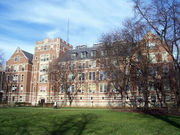
The university spent nearly $405 million in 2008-09 on research,[2] capping a long history of academic research. In 1877, botany professor William J. Beal performed the first documented genetic crosses to produce hybrid corn, which led to increased yields. MSU dairy professor G. Malcolm Trout invented the process for the homogenization of milk in the 1930s. In the 1960s, MSU scientists developed cisplatin, a leading cancer fighting drug. Today Michigan State continues its research with facilities such as the U.S. Department of Energy-sponsored MSU-DOE Plant Research Laboratory[58] and a particle accelerator called the National Superconducting Cyclotron Laboratory. The U.S. Department of Energy Office of Science named Michigan State University as the site for the Facility for Rare Isotope Beams (FRIB). The $550 million facility will attract top researchers from around the world to conduct experiments in basic nuclear science, astrophysics, and applications of isotopes to other fields.

In 2004, scientists at the Cyclotron produced and observed a new isotope of the element germanium, called Ge-60[59] In that same year, Michigan State, in consortium with the University of North Carolina at Chapel Hill and the government of Brazil, broke ground on the 4.1-meter Southern Astrophysical Research Telescope (SOAR) in the Andes Mountains of Chile. The consortium telescope will allow the Physics & Astronomy department to study galaxy formation and origins.[60] Since 1999, MSU has been part of another consortium called the Michigan Life Sciences Corridor, which aims to develop biotechnology research in the State of Michigan.[61] Finally, the College of Communication Arts and Sciences' Quello Center researches current issues of information and communication management.
Endowment
MSU's (private, non-Morrill Act) endowment started in 1916 when the Engineering Building burned down. Automobile magnate R.E. Olds helped the program stay afloat with a gift of $100,000.[62] There was a time when MSU lagged behind peer institutions in terms of endowments. As recently as the early 1990s, MSU was last among the eleven Big Ten schools, with barely over $100 million in endowment funds. That changed dramatically in the early 2000s, when the University started a campaign to increase the size of the endowment. At the close of fiscal year 2004–2005, the endowment had risen to $1.325 billion, raising the University to sixth of the 11 Big Ten schools in terms of endowment; within $2 million of the fifth-rated school.[63] The rapid increase in the size of the endowment will help to improve outdated facilities, such as the Music Building, which the College of Music hopes to soon replace with money from its alumni fundraising program.[64]
Colleges

MSU has over 200 academic programs offered by 17 degree granting colleges.[2]
Residential colleges
MSU has several residential colleges, based on the Oxbridge "living-learning" model. By putting classes in student dormitories, these colleges improve student access to faculty and facilities. MSU's first residential college, Justin Morrill College started in 1965 with an interdisciplinary curriculum.[65] MSU closed Morrill College in 1979, but today the university has three residential colleges, including the recent opening of the Residential College in Arts & Humanities (RCAH) located in Snyder and Phillips halls.
Established in 1967, James Madison College is a smaller component residential college in political science housed in Case Hall. Classes in the college are small, with an average of 25 students, and most instructors are tenure track faculty. James Madison College has about 1150 students total, with each freshman class containing about 320 students.[66] Each of Madison's four majors—Social Relations and Policy, International Relations, Political Theory and Constitutional Democracy, and Comparative Cultures and Politics[67]—requires two years of foreign language and one semester of "field experience” in an internship or study abroad program. Although Madison students make up about 4% of MSU graduates, they represent around 35% of the MSU’s Phi Beta Kappa members.[68]
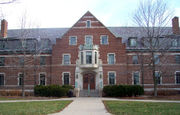
Also established in 1967, Lyman Briggs College teaches math and science within social, historical and philosophical contexts.[69] Many Lyman Briggs students intend to pursue careers in medicine, but the school supports over 30 coordinate majors, from human biology to computer sciences.[70] Lyman Briggs is one of the few colleges that lets undergraduates teach as "Learning Assistants."[71]
MSU's newest residential college is the Residential College in Arts & Humanities. Founded October 21, 2005,[72] the college provides around 600 undergraduates with an individualized curriculum in the liberal, visual and performing arts. Though all the students will graduate with the same degree, MSU encourages students in the college to get a second degree or specialization.[73] The university houses the new college in a newly renovated Snyder-Phillips Hall, the location of MSU's first residential college, Justin Morrill College.[74]
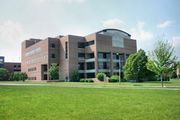
Professional schools
The Michigan State University College of Law is a private law school within a public institution. Founded in Detroit in 1891 as the Detroit College of Law, the law school moved to East Lansing in 1995 becoming an integral part of the university. Students attending MSU College of Law come from 42 states and 13 countries. The law school publishes the Michigan State Law Review,[75] the Michigan State Journal of International Law and the Journal of Medicine and Law. The College of Law is the home of the Geoffrey Fieger Trial Practice Institute,[76] the first trial practice institute in the United States. The Intellectual Property and Communications Law program is ranked seventeenth nationally.[77]
The Eli Broad College of Business has programs in accounting, information systems, finance, management, marketing and supply chain management, and hospitality business. The school has 4,775 undergraduate students and 776 graduate students. The Eli Broad Graduate School of Management, which Business Week magazine ranks 11th among public institutions, offers three MBA programs, as well as joint degrees with the College of Law.[78] The opening of the Eugene C. Eppley Center for Graduate Studies in Hotel, Restaurant and Institutional Management brought the first program in the United States to offer a Master of Business Administration degree in Hotel, Restaurant and Institutional Management to MSU.[79]
The Michigan State University College of Nursing grants B.S.N., M.S.N., and Ph.D. degrees.
Medical schools
The MSU College of Osteopathic Medicine was the world's first publicly funded college of osteopathic medicine.[80] It has a long-standing tradition of retaining its alumni in Michigan to practice – more than two-thirds of the college’s graduates remain to practice in Michigan.[81] Recently, the Michigan State University Board of Trustees approved a resolution endorsing the expansion of the College of Osteopathic Medicine to two sites in southeast Michigan, a move board members and college officials say will not only improve medical education in the state, but also address a projected physician shortage.[82] According to U.S. News & World Report, the College of Osteopathic Medicine (DO degree) has regularly ranked among the top ten medical schools in the country for primary care and the College of Human Medicine (MD degree) has regularly ranked among the top fifty medical schools in the country for primary care.[83]
The College of Human Medicine graduates students with medical doctor MD degrees and is split into seven distinct campuses located in Lansing, Kalamazoo, Flint, Saginaw, Marquette, Traverse City, and Grand Rapids. Each campus is affiliated with local hospitals and other medical facilities professionals in the area.[84] For example, the Lansing campus includes Sparrow Hospital and Ingham Regional Medical Center.[85] The College of Human Medicine has recently gained attention for its expansion into the Grand Rapids area, where a new campus is being built that is expected to fuel the growing medical industry in that region.[86]
Though Michigan State has offered courses in veterinary science since its founding, the College of Veterinary Medicine was not formally established as a four-year, degree-granting program until 1910.[87] Ranked ninth in the nation,[49] the college has over 170,000 square feet (16,000 m2) of office, teaching, and research space, as well as a veterinary teaching hospital.[88]
Other academic units
In recent years, MSU's music program has grown substantially. Music major enrollment increased more than 97% between 1991 and 2004.[89] In early 2007, this growth led the university board of trustees to spin the music program off into its own college unit: The MSU College of Music.[90] The new college faces many new challenges, such as working with limited space[91] and funding.[92] Nevertheless, MSU's music college plans on continued success, placing an annual average of 25 graduate students in tenure stream university positions.[89]
MSU's College of Education at Michigan State University offers graduate and undergraduate degrees in several fields, including counseling, educational psychology, special education, teacher education and kinesiology.[93] The college has had high-ranked programs in elementary,[44] educational technology, educational policy, and secondary education.[45][94] In addition, Michigan State ties the University of Wisconsin–Madison for the top spot in rehabilitation counseling.[95]
Founded in 1956, the MSU Honors College provides individualized curricula to MSU's top undergraduate students. Though the college has no majors of its own, it has its own dean and academic advisers to help Honors students with their educational pursuits. High school students starting at MSU may join the Honors College if they are in the top 5% of their high school graduating class and have either an ACT score of at least 30 or an SAT total score of at least 1360.[96] Once admitted, students must maintain a 3.20 GPA and complete eight approved honors courses in order to graduate with Honors College designation on their degree.[97]
After three years of planning, The College of Engineering successfully launched the first stages of its Residential Experience for Spartan Engineering, formally known as the Residential Option for Scientists and Engineers (ROSES), the new program is located in Wilson Hall after being housed in Bailey Hall for a number of years. The Residential program essentially combines with a brand new academic component, Cornerstone Engineering, where freshman engineering students not only get an overview of the engineering field(s) but get a hands-on experience along with it.[98] Global Engineering is a new subject that is of certain interest for not only the Cornerstone Engineering and Residential Experience programs but for the entire College of Engineering at MSU. Engineering in today's society has shown to have a monumental impact on the global economy due to advancements in education, interdependence on economics with infrastructure, computers, transportation, technology and other manufactured goods as well as Michigan State University's study-abroad program being ranked #1 in the nation, allowing for students to experience education and learn cultures in hundreds of countries.[99] The newly established Cornerstone Engineering and Residential Experience programs for College of Engineering have started programs abroad for more courses in engineering including Study abroad seminars.[100]
MSU currently offers a 30 credit graduate program for Masters in Educational Technology[101] in 3 different formats; completely online,[102] hybrid[103] in East Lansing, Michigan, or overseas. MSU.edu The overseas program is offered at universities around the world. Past locations have included England, France, Switzerland and Thailand. The program lasts one month a summer for three summers, with each summer covering 9 credit hours. One online class is required between the second and third summer. The classes are focused on preparing teachers in integrating technology into their classrooms and helping them understand the affordances and constraints of using different programs. The courses are taught by MSU professors and are open to students around the world.
Athletics
Michigan State's NCAA Division I-A program offers 12 varsity sports for men and 13 for women.[2] Since their teams are called the Spartans, MSU's mascot is a Spartan warrior named Sparty. The university participates in the Big Ten Conference in all varsity sports except ice hockey, which competes in the Central Collegiate Hockey Association. The current athletic director is Mark Hollis, who was promoted to the position on January 1, 2008.[104] Hollis replaced Ron Mason, who served as head hockey coach from 1979 to 2002, retiring with a record total of 924 wins, and a 635–270–69 record at MSU.[105]
Michigan State is among only sixteen Division 1A programs to win multiple national titles in football, and the only school to win multiple national titles in football, basketball, and hockey (MSU was the first athletic program to win multiple national titles in both football and basketball). MSU has won all of its football championships playing only division 1A opponents. The Spartans have participated in two events, in basketball and ice hockey, which have set world records for spectator attendances for both sports.
In 1888 Michigan State University (then as known as Michigan Agricultural College) along with Olivet, Albion and Hillsdale Colleges was a founding member of the nation's oldest athletic conference, the Michigan Intercollegiate Athletic Association (MIAA). MAC left the conference in 1907.
Football
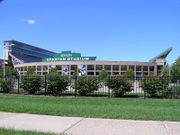
Football has a long tradition at Michigan State. Starting as a club sport in 1884, football gained varsity status in 1896.[106] MSU football teams won the Rose Bowl in 1954, 1956, and 1988. The Spartans accounted for four of the top eight selections in the 1967 NFL Draft, the only time a college football program has accomplished such a feat.
Today, the football team competes in Spartan Stadium, a renovated 75,005 seat football stadium near the center of campus. The current coach is Mark Dantonio, who was hired on November 27, 2006.[107] Dantonio had an 18–17 record in his three year tenure at the University of Cincinnati, including a 1–0 Bowl Game record.[108] He led the team in its first season to a 7–6 record. The Spartans played in the Champs Sports Bowl against Boston College on December 28, 2007 and the Capital One Bowl against Georgia on January 1, 2009. MSU's traditional archrival is the University of Michigan, against whom they compete annually for the Paul Bunyan Trophy. Michigan State is one of three Big Ten teams to have an annual non-conference football game against Notre Dame. MSU's record against the Fighting Irish is 25–44–1 but the Spartans have had much success against the Irish recently, becoming the first team ever to win six straight games at Notre Dame Stadium.[109]

Men's basketball
MSU's men's basketball team has won the National Championship twice: in 1979 and again in 2000.[110] In 1979, Earvin "Magic" Johnson,[111] along with Greg Kelser,[112] Jay Vincent,[113] and Mike Brkovich, led the MSU team to a 75–64 win against the Larry Bird-led Indiana State Sycamores. In 2000, three players from Flint, Michigan, Morris Peterson,[114] Charlie Bell,[115] and Mateen Cleaves[116] led the team to its second national title. Dubbed the "Flintstones", they were the key to the Spartans' win against the University of Florida. On December 13, 2003, Michigan State and Kentucky played in the Basketbowl, in which a record crowd of 78,129 watched the game in Detroit’s Ford Field. Kentucky won 79–74.[117] The basketball team currently plays at the Jack Breslin Student Events Center under head coach Tom Izzo, who has a 336-137 record. The student spirit section at Breslin is called the Izzone. Izzo's coaching has helped the team make six Final Fours since 1999, winning the title in 2000, and thirteen consecutive NCAA tournament appearances (beginning in 1998). In 2009 the Spartans made it to the National Championship game and lost 89-72 to North Carolina.
Men's ice hockey
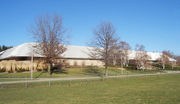
The Michigan State University men's ice hockey team started in 1924, though it has only been a varsity sport since 1950. The team has since won national titles in 1966, 1986, and 2007. The Spartans came close to repeating the national title in 1987, but lost the championship game to the University of North Dakota. They play at MSU's Munn Ice Arena. Former head coach Ron Mason is college hockey's winningest coach with 924 wins total and 635 at MSU.[105] The current head coach is Rick Comley, who has a 34–19–3 record at MSU.[118] Since the Big Ten Conference does not include Division I men's ice hockey, Michigan State competes in the Central Collegiate Hockey Association. Michigan State leads the CCHA in all-time wins, is second in CCHA Conference championships with 7, and is first in CCHA Tournament Championships with 11. Along with the University of Michigan (U-M) and the Ohio State University, it is one of three Big Ten schools in the CCHA. As with other sports, the hockey rivalry between MSU and U-M is a fierce one, and on October 6, 2001, MSU faced U-M in the Cold War, during which a world record crowd of 74,554 packed Spartan Stadium to watch the game end in a 3–3 tie.[119] In the 2006–2007 season, the Men's Ice Hockey team defeated Boston College for its third NCAA hockey championship.[120]
Men's cross country
Between WWI and WWII, Michigan State College competed in the Central Collegiate Conference, winning titles in 1926-1929, 1932, 1933, and 1935. Michigan State also experienced success in the IC4A, at New York’s Van Cortland Park, winning 15 team titles (1933–1937, 1949, 1953, 1956–1960, 1962, 1963, and 1968). Since entering the Big Ten in 1950, Michigan State has won 14 men’s team titles (1951–1953, 1955–1960, 1962, 1963, 1968, 1970 and 1971). Michigan State hosted the inaugural NCAA cross country championships in 1938 and every year thereafter through 1964 (there was no championship in 1943). The Spartans won NCAA championships in 1939, 1948, 1949, 1952, 1955, 1956, 1958, and 1959.[7][121]
Student life

East Lansing is very much a college town, with 60.2% of the population between the ages of 15 and 24.[122] President John A. Hannah's push to expand in the 1950s and 1960s resulted in the largest residence hall system in the United States.[123] Around 16,000 students live in MSU's 23 undergraduate halls, one graduate hall, and three apartment villages. Each residence hall has its own hall government, with representatives in the Residence Halls Association. Yet despite the size and extent of on-campus housing, the residence halls complimented by a variety of housing options. 58% of students live off-campus,[124] mostly in the areas closest to campus, in either apartment buildings, former single-family homes, fraternity and sorority houses, or in a co-op.
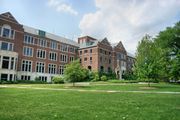
Greek life
With over 3,000 members, Michigan State University's Greek Community is one of the largest in the nation. Started in 1872[125] and re-established in 1922 by Lambda Chi Alpha Fraternity, Alpha Gamma Rho Fraternity, and Alpha Phi Sorority; the MSU Greek system now consists of 55 Greek lettered student societies.[126] These chapters are in turn under the jurisdiction of one of MSU's four Greek governing councils, National Panhellenic Council, North American Interfraternity Council, National Pan-Hellenic Council, and Independent Greek Council. National Pan-Hellenic Council, is made up of 9 organizations, 5 Fraternities and 4 Sororities, that were founded on Historically Black College and Universities HBCU's. The Interfraternity Council and the Women's Panhellenic Council are each entirely responsible for their own budgets, giving them the freedom to hold large fundraising and recruitment events. MSU's fraternities and sororities hold many philanthropy events and community fundraisers. For example, in March 2008 the Greek Community held Greek Week to raise over $208,000 for the American Cancer Society, and $5,000 for each of these charities: Make-a-Wish Foundation (MSU Chapter), Share Laura's Hope, The Mary Beth Knox Scholarship, and the Special Olympics.[127]
Student organizations

The Associated Students of Michigan State University (ASMSU) is the undergraduate student government of Michigan State University.[128] It is unusual amongst university student governments for its decentralized bicameral structure,[129] and the relatively non-existent influence of the Greek system. ASMSU representatives are nonpartisan and many are elected in noncompetitive races.
Students pay $16.75 per semester to fund the functions of the ASMSU, including stipends for the organization's officers and activities throughout the year.[130] Some students have criticized ASMSU for not having enough electoral participation to gain a student mandate. Turnout since 2001 has hovered between 3 and 17 percent, with the 2006 election bringing out 8% of the undergraduate student body.[131]
Student-run organizations beyond student government also have a large impact on the East Lansing/Michigan State University community. One example is the Tower Guard honor society. Tower Guard is the oldest and one of the most respected student organizations on campus [132]
The Eli Broad College of Business includes 27 student organizations. The three largest organizations are the Finance Association (FA), the Accounting Student Association (ASA), and the Supply Chain Management Association (SCMA).[133] The SCMA is the host of the university's largest major specific career fair. The fair attracts over 100 companies and over 400 students each year.[134]
Activism
Activists have played an important role in MSU history.[135] During the height of the Vietnam War, student protests helped create co-ed residence halls, and blocked the routing of Interstate 496 through campus. In the 1980s, Michigan State students convinced the University to divest the stocks of companies doing business in apartheid South Africa from its endowment portfolio, such as Coca-Cola.[136] MSU has many student groups focused on political change. Graduate campus groups include the Graduate Employees Union[137] and the Council of Graduate Students.[138] Michigan State also has a variety of partisan groups ranging from liberal to conservative, including the College Republicans, the College Democrats and several third party organizations. Other partisan activist groups include Young Americans for Freedom and Young Americans for Liberty on the right; Young Democratic Socialists, Students for Economic Justice, Young Communist League and MEChA on the left. Given MSU's proximity to the Michigan state capital of Lansing, many politically inclined Spartans intern for state representatives. In recent years radical left student groups such as the Undergraduate Alliance, ALLeft (All Libertarian, Left), MSU Socialist, and the newly formed Students For Educational Justice have been organizing intensely against what they feel are unjust budget cuts and irresponsible behavior on behalf of the administration. In the past they have organized multiple protests and "town hall" meetings to voice the concerns of the student body. At the moment Michigan State Administrators are radically restructuring the University in fashion that favors the "hard sciences" and strips money away from the humanities, which are severely underfunded. At the end of the restructuring process, MSU will lose 1/6 of its programs according to a recent article by the Detroit Free Press.{{Citation needed|date=April 2010})
Sustainability
The MSU Office of Sustainability works with the University Committee for a Sustainable Campus to "foster a collaborative learning culture that leads the community to heightened awareness of its environmental impact." [139] The University is a member of the Chicago Climate Exchange, the world’s first greenhouse gas emission registry, and boasts the lowest electrical consumption per square foot among Big Ten universities. The University has set a goal of reducing energy use by 15%, reducing greenhouse gas emissions by 15%, reducing landfill waste by 30% by 2015.[140]
The university has also pledged to meet LEED-certification standards for all new construction. In July 2009, the University will complete construction on a $13.3 million recycling center, and hopes to double their 2008 recycling rate of 14% by 2010. [141]
The Environmental Steward’s program support’s President Simon’s “Boldness by Design” strategic vision to transform environmental stewardship on campus within the seven year time frame.[142] Environmental stewards promote environmental changes among co-workers and peers, be points of contact for their department for environment-related concerns, and be liaisons between the Be Spartan Green Team and buildings.[142]
ECO is the leading student-run sustainability organization on campus. They are also affiliated with regional and national groups such as Campus Climate Challenge and the Michigan Student Sustainability Coalition.[143]
The Student Organic Farm is a student-run, four-season farm, which teaches the principals of organic farming and through a certificate program and community supported agriculture (CSA) on ten acres on the MSU campus.[144] The certificate program consists of year round crop production, course work in organic farming, practical training and management, and an off-site internship requirement.[145]
Media
MSU has a variety of campus media outlets. The student-run newspaper, the The State News, is the country’s most widely distributed campus newspaper. Free copies of the paper are available online or at East Lansing newsstands. The paper prints 28,500 copies of the paper Monday through Friday during the fall and spring semesters, and 15,000 copies Monday through Friday during the summer.[147] The paper is not published on weekends, holidays, or semester breaks. The campus yearbook, the Red Cedar Log, is the largest in the United States.[148] Red Cedar Review, Michigan State University's premier literary digest for over forty years, is the longest running undergraduate-run literary journal in the United States.[149] It is published annually by the Michigan State University Press.
Electronic media include three radio stations and one public television station, as well as student-produced television shows. MSU's Public Broadcasting Service affiliate, WKAR-TV, the station is the second-oldest educational television station in the United States, and the oldest east of the Mississippi River. Besides broadcasting PBS shows, WKAR-TV produces its own local programming, such as a high school quiz bowl show called "QuizBusters". In addition, MSU has three radio stations; WKAR-AM plays National Public Radio's talk radio programming, whereas WKAR-FM focuses mostly on classical music programming.[150] Michigan State's student-run radio station, WDBM, broadcasts mostly alternative music during weekdays, and electric music programming nights and weekends.[151]

People
The current president of the University is Lou Anna Simon who took over on January 1, 2005 after being appointed by MSU's governing board, the Board of Trustees. The Board receives its mandate from the Michigan Constitution since MSU is a state-owned school. The constitution allows for eight trustees who are elected by statewide referendum every two years. Trustees have eight-year terms, with two of the eight elected every other year.[152] As of 2007, the Board is made up of three Republicans and five Democrats.[153]
19th century
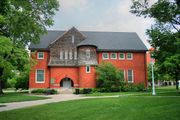
Important College leaders in the 1800s include John C. Holmes, who kept the Agriculture School from being a part of the University of Michigan and is widely credited with being the prime mover for the school's founding;[9] Joseph R. Williams, the first president;[11] and Theophilus C. Abbot, the third president who stabilized the College after the Civil War.[154] Also of importance was botany professor William J. Beal, an early plant (hybrid corn) geneticist who championed the laboratory teaching method.[155] Another distinguished faculty member of the era was the alumnus/professor Liberty Hyde Bailey.[156] Bailey was the first to raise the study of horticulture to a science, paralleling botany, which earned him the title of "Father of American Horticulture".[157] William L. Carpenter, a jurist who was elected to the Third Judicial Circuit of Michigan in 1894, and member of the Michigan Supreme Court from 1902 until 1904. Other famous 19th century graduates include Ray Stannard Baker,[158] a famed "muckraker" journalist and Pulitzer Prize winning biographer; Minakata Kumagusu,[159] a renowned environmental scientist; and William Chandler Bagley, a pioneering education reformer.[160]

20th and 21st centuries
Today, there are around 460,000 living MSU alumni worldwide.[2] Famous MSU alumni include former Michigan governors James Blanchard[161] and John Engler,[162] U.S. Senators Debbie Stabenow[163] and Tim Johnson, U.S. ambassador to Brazil Donna Hrinak, former Jordan Prime Minister Adnan Badran, billionaire philanthropist Eli Broad,[164] Chief Justice of the Texas Supreme Court Wallace B. Jefferson,[165] trial lawyer Geoffrey Feiger, former Detroit mayor Kwame Kilpatrick, Pulitzer Prize-winning novelist Richard Ford, Teamsters president James P. Hoffa,[166] Quicken Loans founder and Cleveland Cavaliers owner and billionaire Dan Gilbert,[167] Sergeant at Arms of the U.S. House of Representatives Wilson Livingood,[168] former Michigan U.S. Senator and Secretary of Energy Spencer Abraham,[169] former Vice President of the Republic of Liberia Harry Moniba, and former U.S. Ambassador to Italy Peter Secchia. Alumni in Hollywood include actors James Caan,[170] Anthony Heald,[171] Robert Urich,[172] and William Fawcett;[173] comedian Dick Martin, director Sam Raimi,[174] and screenwriter David Magee.[175] Journalists include NBC reporter Chris Hansen,[176] AP White House Correspondent Nedra Pickler, and NPR Washington Correspondent Don Gonyea. Novelist Michael Kimball graduated in 1990. Susan K. Avery, the first woman president and director of the Woods Hole Oceanographic Institution, received an MSU bachelor's degree in physics.[177] In addition, two of the Little Rock Nine attended Michigan State, including Ernest Green,[178] the first black student to graduate from Little Rock Central High School; and Carlotta Walls LaNier.[179] The University awarded an honorary degree to Robert Mugabe in 1990,[180] but revoked it in 2008.[181]
Spartans formerly or currently in the NBA include Earvin "Magic" Johnson,[111] Greg Kelser,[112] Jay Vincent,[113] Steve Smith,[182] Scott Skiles,[183] Jason Richardson,[184] Mateen Cleaves,[116] Alan Anderson,[185] Zach Randolph,[186] Morris Peterson[114] and Charlie Bell.[115] On the American Football League's All-Time Team are tight-end Fred Arbanas[187] and safety George Saimes.[188] In the National Football League, MSU alumni include Carl Banks, who was a member of the Giants teams that won Super Bowls XXI and XXV. Banks was a standout in their Super Bowl XXI victory in which he recorded 14 total tackles, including ten solo tackles as well as being part of the NFL's 1980's All-Decade Team Morten Andersen,[189] Plaxico Burress,[190] Andre Rison,[191] Derrick Mason,[192] Muhsin Muhammad,[193] T.J. Duckett,[194] Flozell Adams,[195] Julian Peterson,[196] Charles Rogers,[197] Jim Miller,[198] Earl Morrall,[199] Wayne Fontes,[200] Bubba Smith,[201] and Drew Stanton.[202] Former MSU quarterback Jeff Smoker now plays in the Arena Football League.[203] Former Michigan State players in the National Hockey League include All Star Defensemen Duncan Keith, Rod Brind'Amour,[204] Anson Carter,[205] Donald McSween,[206] Adam Hall,[207] John-Michael Liles, Justin Abdelkader, brothers Kelly Miller[208] and Kip Miller,[209] as well as their cousins, brothers Ryan Miller[210] and Drew Miller.[211] Former Michigan State players in Major League Baseball include Hall of Fame inductee Robin Roberts,[212]Kirk Gibson,[213] Steve Garvey,[214] and Mark Mulder.[215] Olympic gold medalists include Savatheda Fynes,[216] and Frederick Alderman.[217] The Spartans are also contributing athletes to Major League Soccer, as Kevin Reiman, Doug Demartin, Dave Hertel, Greg Janicki, Kenzo Webster, Rauwshan McKenzie, John Minagawa-Webster and Ryan McMahen have all played in Major League Soccer.[218] In addition, Alex Skotarek, Steve Twellman, and Buzz Demling played in the North American Soccer League, with Demling playing in the 1972 Summer Olympics and the United States Men's National Soccer Team in the 1970s.
See also
- List of Colleges and Universities in Michigan
- List of Land-grant Universities
- Morrill Land-Grant Colleges Act
- East Lansing, Michigan
- Lansing, Michigan
- State of Michigan Education
- Michigan State University College of Law
- List of Michigan State University People
- Michigan State University Athletics
- List of Michigan State University Championships
- Big Ten Conference
- Michigan State University Libraries
- Michigan State University Press
- The State News
References
- ↑ As of June 30, 2009. "U.S. and Canadian Institutions Listed by Fiscal Year 2009 Endowment Market Value and Percentage Change in Endowment Market Value from FY 2008 to FY 2009" (PDF). 2009 NACUBO-Commonfund Study of Endowments. National Association of College and University Business Officers. http://www.nacubo.org/Documents/research/2009_NCSE_Public_Tables_Endowment_Market_Values.pdf. Retrieved February 17, 2010.
- ↑ 2.0 2.1 2.2 2.3 2.4 2.5 2.6 2.7 2.8 "MSU Facts". Michigan State University Newsroom. Accessed June 21, 2010.
- ↑ "MSU enrollment up slightly from a year ago". MSU News. http://news.msu.edu/story/6816/&topic_id=15. Retrieved January 14, 2010.
- ↑ "Official MSU Colors". Michigan State University Web Style Guide. 2010. Accessed February 17, 2010.
- ↑ Greene, Howard and Greene, Matthew. The Public Ivies: America's Flagship Public Universities (New York: HarperCollins, 2001). ISBN 0-06-093459-X.
- ↑ "Michigan State Recognized National Championships". College Football Data Warehouse. Accessed December 28, 2007. Archived March 20, 2007 at the Wayback Machine.
- ↑ 7.0 7.1 Frimodig, L., & Stabley, F. (1971). Spartan Saga: A History of Michigan State Athletics. East Lansing: Michigan State University.
- ↑ "Michigan Constitution of 1850". Wikisource. Article 13, Section 11. Accessed March 5, 2008.
- ↑ 9.0 9.1 9.2 "Milestones of MSU's Sesquicentennial". MSU University Archives and Historical Collection. Accessed March 5, 2008.
- ↑ Darling, Birt. (1950). City in the Forest; The Story of Lansing. New York: Stratford House. pp. 121. LCCN 50008202.
- ↑ 11.0 11.1 "Joseph R. Williams Biographical Information". MSU University Archives and Historical Collection Accessed March 5, 2008.
- ↑ Miller, Whitney. (2002). East Lansing: Collegeville Revisited (Images of America). Charleston, South Carolina: Arcadia Publishing. pp. 26. ISBN 0-7385-2045-4.
- ↑ Heineman, Kenneth J. (1993). Campus Wars: The Peace Movement at American State Universities in the Vietnam Era. New York: New York University Press. pp. 21. ISBN 0-8147-3512-6.
- ↑ "It's Big 10 Now - Spartans Admitted". Wisconsin State Journal. 1949-05-21, p. 13.
- ↑ Kuhn, Madison. (1955). Michigan State: The First Hundred Years, 1855–1955. East Lansing: Michigan State University Press. pp. 471. ISBN 0-87013-222-9.
- ↑ Michigan.gov
- ↑ Bruns, Adam (January 2009).How Are You Helping Companies Grow?.Site Selection Magazine. Retrieved on December 27, 2009.
- ↑ Darrow, Bob. Simon: MSU to be model university. The State News. September 9, 2005. Accessed March 5, 2008.
- ↑ Saints' Rest: Early Campus Life at MSU. Michigan State University. Retrieved on March 5, 2008.
- ↑ "Building Data Summary". MSU Physical Plant. Accessed February 18, 2010.
- ↑ "Frequently Asked Questions". MSU Resource Center for Persons with Disabilities (RCPD). Accessed March 5, 2008.
- ↑ "Land Management Office". Michigan State University Land Management Office. August 29, 2005. Accessed March 5, 2008.
- ↑ Stanford, Linda O. (2002). MSU Campus: Buildings, Places, Spaces. East Lansing: Michigan State University Press. pp. 60. ISBN 0-87013-631-3.
- ↑ Roeschke, Jaclyn. "Former 'U' president immortalized with bronze statue". The State News. September 20, 2004. Accessed March 5, 2008.
- ↑ "MSU Museum - About the Museum". Accessed February 25, 2009.
- ↑ "2020 Vision Campus Master Plan". MSU Campus Planning and Administration. 2006. Accessed March 5, 2008. Archived March 15, 2008 at the Wayback Machine.
- ↑ Stanford, Linda (2002). MSU Campus: Buildings, Places, Spaces. East Lansing, Michigan: Michigan State University Press. ISBN 0-87013-631-3.
- ↑ About Michigan State University Dubai - http://dubai.msu.edu/quick-facts/about-msu-dubai/news/msu-dubai-challenges-middle-east-students-dream-big-committing-new-
- ↑ Degrees Conferred-Fiscal YearOffice of the Registar Retrived June, 22,2010
- ↑ "Michigan State University: Student Body". The Princeton Review. 2005.
- ↑ Davis, Amy. (2005). Michigan State University Off the Record. College Prowler. pp. 4. ISBN 1-59658-083-6.
- ↑ Greene, Howard R. & Greene, Matthew W. (2001). The Public Ivies: America’s Flagship Public Universities (1st ed.). New York: Cliff Street Books. ISBN 0-06-093459-X.
- ↑ "America’s longest-operating Office of the Ombudsman turns 40". Michigan State University Newsroom. September 19, 2007. Accessed December 15, 2007.
- ↑ Thoel, Tara. "Adjunct physics professor at MSU wins Nobel Prize". The State News. October 9, 2007. Accessed December 15, 2007.
- ↑ "Studies in Antarctic System Science—Antarctica". MSU Office of Study Abroad. Accessed March 5, 2008.
- ↑ Search National Academy of Sciences Accessed April 8, 2010.
- ↑ "Academic Ranking of World Universities". Institute of Higher Education, Shanghai Jiao Tong University. 2010. http://www.arwu.org/ARWU2010.jsp. Retrieved May 31, 2010.
- ↑ "United States Universities in Top 500". Institute of Higher Education, Shanghai Jiao Tong University. 2010. http://www.arwu.org/Country2010Main.jsp?param=United%20States. Retrieved May 31, 2010.
- ↑ "America's Best Colleges". Forbes. 2010. http://www.forbes.com/lists/2010/94/best-colleges-10_Americas-Best-Colleges_Rank.html. Retrieved August 19, 2010.
- ↑ "National Universities Rankings". America's Best Colleges 2011. U.S. News & World Report. 2010. http://colleges.usnews.rankingsandreviews.com/college/national-search. Retrieved August 29, 2010.
- ↑ "The Washington Monthly National University Rankings". The Washington Monthly. 2010. http://www.washingtonmonthly.com/college_guide/rankings_2010/national_university_rank.php. Retrieved August 29, 2010.
- ↑ "Top 500 World Universities". Institute of Higher Education, Shanghai Jiao Tong University. August 15, 2007. Accessed March 5, 2008.
- ↑ "America's Best Colleges 2008". U.S. News and World Report. Accessed February 22, 2008.
- ↑ 44.0 44.1 "America's Best Graduate Schools 2008: Elementary Education." U.S. News and World Report. Accessed February 22, 2008.
- ↑ 45.0 45.1 "America's Best Graduate Schools 2008: Secondary Education." U.S. News and World Report. Accessed February 22, 2008.
- ↑ "America's Best Graduate Schools 2008: Psychology Specialties: Industrial/Organizational Psychology." U.S. News and World Report. Accessed February 22, 2008.
- ↑ "NCA Doctoral Reputational Study, 2004 National Communication Association.Retrived June 22, 2010
- ↑ "Supply Chain Management/Logistics". USNews.com:America's Best Colleges 2008. Accessed March 5, 2008.
- ↑ 49.0 49.1 "MSU professional and grad programs maintain strong positions in rankings". Michigan State University Newsroom. March 30, 2007. Accessed March 6, 2008.
- ↑ Rykert, Wilbur Lewis. "The History of the School of Criminal Justice at Michigan State University 1935–1963" (Masters Thesis). 1985.
- ↑ "About Us: Fast Facts". MSU College of Music. Accessed March 5, 2008. Archived August 15, 2007 at the Wayback Machine.
- ↑ MSU.edu, "Historic Milestones" (PDF). The School of Hospitality Business. Accessed March 5, 2008.
- ↑ MSU.edu, "history", MSU School of Packaging. Accessed March 5, 2008. Archived March 15, 2008 at the Wayback Machine.
- ↑ MSU.edu, "Achievements". MSU Department of Political Science. Accessed March 5, 2008.
- ↑ MSU.edu, "Dietetics". MSU Department of Food Science and Human Nutrtion. Accessed April 27, 2008.
- ↑ MSU.edu, "MSU communication programs lead nation". Michigan State University newsroom. December 10, 2004. Accessed January 30, 2008.
- ↑ Greenreportcard.org
- ↑ [1]
- ↑ "First observation of Germanium-60 and Selenium-64". NSCL Science Nuggets. Accessed April 10, 2010.
- ↑ "Points of Pride". MSU Today. Accessed March 5, 2008. Archived March 15, 2008 at the Wayback Machine.
- ↑ Truscott, John. "Governor Signs Bill Creating 'Life Sciences Corridor' in Michigan". Michigan Executive Office press release. July 19, 1999. Accessed March 5, 2008.
- ↑ Rodriguez, Michael (2004). R.E. Olds and Industrial Lansing. Charleston, South Carolina: Arcadia Publishing. pp. 117. ISBN 0-7385-3272-X.
- ↑ Seguin, Rick. "Endowment surges in growth, rankings". MSU News Bulletin. 2006. Accessed March 5, 2008.
- ↑ "Capital Campaign". MSU School of Music. Accessed March 5, 2008. Archived March 15, 2008 at the Wayback Machine.
- ↑ "Unofficial website". Justin Morrill College. Accessed March 5, 2008.
- ↑ "Quick Madison Facts". James Madison College @ Michigan State University. Accessed June 25, 2007
- ↑ "You and JMC". James Madison College @ Michigan State University. Accessed June 25, 2007
- ↑ "Quick Madison Facts". James Madison College @ Michigan State University. Accessed March 5, 2008.
- ↑ "Educational Philosophy". Lyman Briggs College. Accessed March 5, 2008.
- ↑ "Majors". Lyman Briggs College. Accessed June 18, 2010.
- ↑ "Undergraduate Learning Assistant Application 2008-2009" (PDF). Lyman Briggs College. Accessed March 5, 2008. Archived April 10, 2008 at the Wayback Machine.
- ↑ Collins, Laura. "Trustees approve residential college". The State News. October 24, 2005. Accessed March 5, 2008.
- ↑ "How the Program Works". Michigan State University Residential College in Arts & Humanities. Accessed December 15, 2007.
- ↑ "Living in the College". Michigan State University Residential College in Arts & Humanities. Accessed March 5, 2008.
- ↑ "Main Page". Michigan State Law Review. Accessed March 5, 2008. Archived July 2, 2007 at the Wayback Machine.
- ↑ "The Geoffrey Fieger Trial Practice Institute". Michigan State University College of Law. Accessed March 5, 2008.
- ↑ White, Russ. "Press Release". Michigan State University Newsroom. April 4, 2006. Accessed March 5, 2008.
- ↑ "Graduate Programs". The Eli Broad College of Business and Eli Broad Graduate School of Management. Accessed March 6, 2008.
- ↑ "Historic milestones", MSU School of Hospitality and Business. p 2. Retrieved 6/10/08.
- ↑ "A Message from the Dean". MSU College of Osteopathic Medicine. Accessed March 6, 2008.
- ↑ "Brief History of the Michigan State University College of Osteopathic Medicine". MSU College of Osteopathic Medicine. Accessed March 6, 2008.
- ↑ "MSU board endorses expansion of osteopathic college to southeast Michigan". MSU College of Osteopathic Medicine. May 18, 2007. Accessed March 6, 2008.
- ↑ "America's Best Graduate Schools 2008." U.S. News & World Report. Accessed March 6, 2008.
- ↑ "Medical Education". Michigan State University College of Human Medicine. Accessed Jun 18, 2010.
- ↑ "Lansing Campus". Michigan State University College of Human Medicine. Accessed June, 18, 2010.
- ↑ Schneider, Keith. "Grand Rapids Lays Foundations for a Health Mecca". The New York Times. July 11, 2007. Accessed December 10, 2007.
- ↑ "About the College". Michigan State University College of Veterinary Medicine. Accessed March 6, 2008.
- ↑ "Facilities". Michigan State University College of Veterinary Medicine. Accessed March 6, 2008.
- ↑ 89.0 89.1 "Fast Facts". Michigan State University College of Music. Accessed December 15, 2007. Archived August 15, 2007 at the Wayback Machine.
- ↑ Harbison, Sarah. "Music school becomes MSU's 16th college". The State News. February 23, 2007. Accessed March 6, 2008.
- ↑ Thoel, Tara. "Music Building overcrowded, students fight for practice time". The State News. October 16, 2007. Accessed March 6, 2008.
- ↑ Thoel, Tara. "New rhythm: College of Music celebrates new status with concert". The State News. September 26, 2007. Accessed March 6, 2008.
- ↑ "About Our College". Michigan State University College of Education. Accessed March 6, 2008.
- ↑ Henion, Andy. "MSU education programs top national rankings for 14th consecutive year". MSU Today. March 28, 2008. Accessed March 28, 2008.
- ↑ "Graduate Programs Rankings 2008." Michigan State University College of Education. Accessed March 28, 2008.
- ↑ "Prospective Members". Michigan State University Honors College. Accessed December 15, 2007.
- ↑ "Honors Requirements." Michigan State University Honors College. Accessed December 15, 2007.
- ↑ MSU.edu Michigan State University. College of Engineering. Residential Experience for Spartan Engineering.
- ↑ MSU.edu, MSU Study abroad. Accessed September 8th, 2009
- ↑ MSU.edu, College of Engineering. Currents Magazine. Summer 2009. Volume 9 Number
- ↑ MSU.edu
- ↑ MSU.edu
- ↑ MSU.edu
- ↑ "Michigan State promotes Mark Hollis to athletic director". USA Today. September 12, 2007. http://www.usatoday.com/sports/2007-09-12-3746318224_x.htm. Retrieved May 12, 2010.
- ↑ 105.0 105.1 "Player Bio: Ron Mason. MSU Spartans.com. Accessed March 6, 2008.
- ↑ Grinczel, Steve. (2003). They Are Spartans. Charleston, South Carolina: Arcadia Publishing. pp. 9. ISBN 0-7385-3214-2.
- ↑ "Michigan State Looks to Cincinnati for Coach". The New York Times. November 27, 2006. Accessed March 6, 2008.
- ↑ "Michigan State hires former Cincy coach Dantonio". ESPN.com. November 27, 2006. Accessed March 6, 2008.
- ↑ "Michigan State vs. Notre Dame". College Football Data Warehouse. Accessed March 6, 2008. Archived September 30, 2007 at the Wayback Machine.
- ↑ "Spartans can relate to Izzo's winning ways". ESPN.com. Accessed March 10, 2009.
- ↑ 111.0 111.1 "Magic Johnson Statistics". Basketball-Reference.com. Accessed March 6, 2008.
- ↑ 112.0 112.1 "Greg Kelser Statistics". Basketball-Reference.com. Accessed March 6, 2008.
- ↑ 113.0 113.1 "Jay Vincent Statistics". Basketball-Reference.com. Accessed March 6, 2008.
- ↑ 114.0 114.1 "Morris Peterson Statistics". Basketball-Reference.com. Accessed March 6, 2008.
- ↑ 115.0 115.1 "Charlie Bell Statistics". Basketball-Reference.com. Accessed March 6, 2008.
- ↑ 116.0 116.1 "Mateen Cleaves Statistics". Basketball-Reference.com. Accessed March 6, 2008.
- ↑ "Men's Basketball Falls To No. 8 Kentucky, 79–74". MSU Spartans.com. Accessed March 6, 2008.
- ↑ "Player Bio: Rick Comley". MSU Spartans.com. Accessed March 6, 2008.
- ↑ "Spartan Hockey Ties Wolverines In Front Of Record Crowd". MSU Spartans.com. October 6, 2001. Accessed March 6, 2008.
- ↑ "Abdelkader's Last-Minute Tally Hands Spartans Third NCAA Title". MSU Spartans.com. April 7, 2007. Accessed March 6, 2008.
- ↑ Erickson, C. (2007). 2007-2008 Michigan State Cross Country and Track and Field Media Guide. East Lansing: MSU Sports Information Office.
- ↑ East Lansing city, Michigan". U.S. Census. 2000. Accessed April 13, 2007.
- ↑ Kiernan, Vincent. "Michigan State Asks Students to Turn Off Their Computers Over Winter Break". The Chronicle of Higher Education. January 2, 2003. Accessed April 13, 2007. Archived September 30, 2007 at the Wayback Machine.
- ↑ "Michigan State University: Campus Life". The Princeton Review. 2005.
- ↑ "Greek Affairs". Michigan State University Department of Student Life. Accessed December 15, 2007.
- ↑ "Home". Michigan State University Greek Societies. Accessed December 15, 2007. Archived December 16, 2007 at the Wayback Machine.
- ↑ Spurlock, Amanda. "Cancer relay promotes unity, awareness". The State News, March 27, 2006. Accessed April 13, 2007.
- ↑ "Michigan State University - Student Government". Associated Students of Michigan State University. Accessed March 26, 2008.
- ↑ Associated Students of Michigan State University Website. "Organizational Flowchart." (PDF File). Accessed July 20, 2006. Archived September 1, 2006 at the Wayback Machine.
- ↑ Jourdan, Kristi. "ASMSU tax hike to fund new positions". The State News. March 29, 2006. Accessed March 5, 2008.
- ↑ Jourdan, Kristi. "Student vote count still low for ASMSU". The State News. March 27, 2006. Accessed March 5, 2008.
- ↑ About Tower Guard. MSU Tower Guard
- ↑ Business Week. 2008. Undergraduate profile. Accessed July 9, 2008.
- ↑ Michigan State University. 2008. Accessed July 9, 2008. http://www.bus.msu.edu/clubs/scma/careerfair/
- ↑ Daniel Sturm, "Where is McPherson leading Moo U? Critics see comparisons to MSU’s Vietnam-era role". The Lansing City Pulse. 5 May 2004. http://www.lansingcitypulse.com/lansing/archives/040505/040505cover.html. Retrieved 31 October 2009.
- ↑ U.S. Senate Committee on Banking, Housing, and Urban Affairs. (1985). The Anti-Apartheid Act of 1985. Washington: U.S. Government Printing Office. pp. 213.
- ↑ "About & FAQs". Graduate Employees Union at Michigan State University. Accessed December 15, 2007.
- ↑ "Welcome". MSU Council of Graduate Students. Accessed December 15, 2007.
- ↑ "The Office of Campus Sustainability". Michigan State University. http://www.ecofoot.msu.edu/index.htm. Retrieved 2008-05-21.
- ↑ "MSU honored by National Wildlife Federation for sustainability efforts". Michigan State University. http://news.msu.edu/story/5634/. Retrieved 2008-05-21.
- ↑ "MSU Board of Trustees OKs $13.3M step to go ‘green’". Michigan State University. http://statenews.com/index.php/article/2008/01/msu_board_of_trustees_oks_133m_step_to_go_green. Retrieved 2008-05-21.
- ↑ 142.0 142.1 "Environmental Stewardship Program". Michigan State University. http://www.bespartangreen.msu.edu/about/index.html. Retrieved 2008-05-21.
- ↑ "MSU ECO Get Involved On Campus". Michigan State University. https://www.msu.edu/~eco/campus.html. Retrieved 2008-05-21.
- ↑ "MSU Organic Farm". Michigan State University. http://www.msuorganicfarm.org/home.php/. Retrieved 2008-05-21.
- ↑ "Certificate Program Overview". Michigan State University. http://www.msuorganicfarm.org/certificateprogram.htm. Retrieved 2008-05-21.
- ↑ Oswald, Tom. "'Sparty' Unveiled". MSU Today. August 26, 2005. Accessed April 14, 2007.
- ↑ "Masthead". The State News Accessed April 13, 2007.
- ↑ "About RCL". Red Cedar Log website. Accessed December 15, 2007
- ↑ "About Red Cedar Review". Red Cedar Review website. Accessed December 15, 2007
- ↑ "Main Page". WKAR.org. Accessed April 13, 2007.
- ↑ "Shows". Impact 89FM. Accessed December 15, 2007
- ↑ "Michigan Constitution of 1963". Article VIII. Section 5. Accessed April 13, 2007.
- ↑ Roeschke, Jaclyn. "Ferguson, Foster win MSU trustee seats". The State News. November 5, 2004. Accessed April 13, 2007.
- ↑ "Theophilus Capen Abbot". Michigan State University Archives & Historical Collections. Accessed January 9, 2008.
- ↑ "William James Beal Society". Campaign for MSU University Development. Accessed April 18, 2007. Archived April 16, 2007 at the Wayback Machine.
- ↑ "Liberty Hyde Bailey - A Man for All Seasons". Cornell University Library. p. 7. Accessed April 27, 2007.
- ↑ Hugo, Nancy (1997). Earth Works: Readings for Backyard Gardeners. University of Virginia Press. pp. 68. ISBN 0-8139-1831-6.
- ↑ Bannister, Robert. "Ray Stannard Baker". Swathmore Department of History. Accessed April 21, 2007.
- ↑ "Going Abroad". Minakata Kumugusu Museum. Accessed January 9, 2008.
- ↑ Null, J. Wesley. A Disciplined Progressive Educator: The Life and Career of William Chandler Bagley' (PDF). New York: Peter Lang. ISBN 0-8204-6909-2.
- ↑ "Blanchard, James Johnston". 208. "Abdulaziz Mohammed Al-Failakawi, Commercial Analyst and Relationship Manager at Kuwait International Bank. Biographical Directory of the United States Congress. Accessed April 28, 2007
- ↑ "Governor John Engler Biography". Michigan's Former Governors. Accessed April 29, 2007.
- ↑ "Biography". United States Senator Debbie Stabenow. Accessed April 29, 2007.
- ↑ "400 Richest Americans - 42 - Eli Broad". Forbes. September 21, 2006. Accessed April 26, 2006.
- ↑ State.tx.us
- ↑ "Biography of General President Hoffa", teamster.org. International Brotherhood of Teamsters. Accessed April 26, 2006. Archived April 15, 2006 at the Wayback Machine.
- ↑ "400 Richest Americans - 354 - Daniel Gilbert". Forbes. September 21, 2006. Accessed April 26, 2006.
- ↑ "Wilson Livingood: Security for the U.S. Home". Michigan State University Alumni Association Magazine. Accessed January 9, 2008.
- ↑ "Secretary of Energy Spencer Abraham". The White House. Accessed April 29, 2007.
- ↑ "James Caan - Biography". Internet Movie Database. Accessed April 27, 2007.
- ↑ "Anthony Heald - Biography". Internet Movie Database. Accessed April 27, 2007.
- ↑ "Robert Urich - Biography". Internet Movie Database. Accessed April 27, 2007.
- ↑ "William Fawcet - Biography". Internet Movie Database. Accessed January 25, 2008.
- ↑ "Bob Murawski - Biography". Internet Movie Database. Accessed April 27, 2007.
- ↑ "2006 Distinguished Alumni Award: David S. Magee, BA Theatre '84". Michigan State University College of Arts and Letters. Accessed January 9, 2008.
- ↑ "Chris Hansen". "Dateline NBC". Accessed November 13, 2007
- ↑ "WHOI names Dr. Susan K. Avery first woman president". Cape Cod Today. October 16, 2007. http://www.capecodtoday.com/news716.htm. Retrieved 2009-10-30.
- ↑ "MSU Announces Celebratory Plans in Honor of Dr. Martin Luther King Jr.". MSU Newsroom. January 12, 2000. Accessed April 26, 2006.
- ↑ "Carlotta Wells Lanier". Encyclopedia of Arkansas. Accessed April 28, 2007
- ↑ MSU considers revoking honorary degree awarded to Mugabe
- ↑ "Mugabe Stripped Of MSU Degree". WILX.com. 2008-09-12. http://www.wilx.com/home/headlines/28302079.html. Retrieved 2008-10-20.
- ↑ "Steve Smith Statistics". Basketball-Reference.com. Accessed April 20, 2007.
- ↑ "Scott Skiles Statistics". Basketball-Reference.com. Accessed April 20, 2007.
- ↑ "Jason Richardson Statistics". Basketball-Reference.com. Accessed April 20, 2007.
- ↑ "Alan Anderson Statistics". Basketball-Reference.com. Accessed January 9, 2008.
- ↑ "Zach Randolph Statistics". Basketball-Reference.com. Accessed April 20, 2007.
- ↑ "Chiefs History 1960s". Kansas City Chiefs. Accessed April 28, 2007. Archived April 16, 2007 at the Wayback Machine.
- ↑ "George Saimes Statistics". Pro-Football-Reference.com. Accessed January 9, 2008.
- ↑ "Morten Andersen". NFLPlayers.com. Accessed April 28, 2007.
- ↑ "Plaxico Burress". NFLPlayers.com. Accessed April 28, 2007.
- ↑ "Andre 'Bad Moon' Rison". AndreRison.com. Accessed April 28, 2007. Archived April 16, 2007 at the Wayback Machine.
- ↑ "Derek Mason". NFLPlayers.com. Accessed April 28, 2007.
- ↑ "Muhsin Muhammad". NFLPlayers.com. Accessed April 28, 2007.
- ↑ "T.J. Duckett". NFLPlayers.com. Accessed April 28, 2007.
- ↑ "Flozell Adams". NFLPlayers.com. Accessed April 28, 2007.
- ↑ "Julian Peterson". NFLPlayers.com. Accessed April 28, 2007.
- ↑ "Charles Rogers Statistics". Pro-Football-Reference.com. Accessed January 9, 2008.
- ↑ "MSU Announces Football Broadcast Team". MSUSpartans.com. Accessed April 28, 2007.
- ↑ "Class of '87". Muskegon Area Sports Hall of Fame. Accessed April 28, 2007.
- ↑ "Wayne Fontes Statistics". Pro-Football-Reference.com. Accessed January 9, 2008.
- ↑ "George Webster." College Football Hall of Fame. Accessed April 28, 2007.
- ↑ "Drew Stanton". NFL Football at CBSSports.com. Accessed January 9, 2008.
- ↑ "#15 Smoker, Jeff, QB". azrattlers.com. Accessed January 9, 2008.
- ↑ "Rod Brind'Amour." Internet Hockey Database. Accessed January 9, 2008.
- ↑ "Anson Carter." Internet Hockey Database. Accessed April 21, 2007.
- ↑ "Don McSween." Internet Hockey Database. Accessed January 9, 2008.
- ↑ "Adam Hall." Internet Hockey Database. Accessed April 21, 2007.
- ↑ "Kelly Miller." Internet Hockey Database. Accessed April 21, 2007.
- ↑ "Kip Miller." Internet Hockey Database. Accessed April 21, 2007.
- ↑ "Ryan Miller."Florida Panthers star forward David Booth also attended MSU. Internet Hockey Database. Accessed April 21, 2007.
- ↑ "Drew Miller". Internet Hockey Database. Accessed January 9, 2008.
- ↑ Robin Roberts". National Baseball Hall of Fame. Accessed April 17, 2007. Archived April 5, 2007 at the Wayback Machine.
- ↑ "Kirk Gibson Baseball Stats". Baseball Almanac. Accessed April 29, 2007.
- ↑ "Steve Garvey". Michigan State Baseball Alumni. Accessed April 29, 2007.
- ↑ "Mark Mulder". The Official Site of the St. Louis Cardinals. Accessed April 17, 2007.
- ↑ "Major Athletic Award Winners Announced at Michigan State". msuspartans.cstv.com. June 12, 1997. Accessed January 9, 2008.
- ↑ "Frederick Alderman, Oldest U.S. Olympic Gold Medalist, 93". The New York Times. September 21, 1998. Accessed January 9, 2008.
- ↑ "Kevin Reiman Selected In MLS Supplemental Draft". msuspartans.cstv.com. January 28, 2008 Accessed April 11, 2008.
Further reading
- Kuhn, Madison. (1955). Michigan State: The First Hundred Years, 1855–1955. East Lansing: Michigan State University Press. ISBN 0-87013-222-9.
- Stanford, Linda O., and Dewhurst, C. Kurt. (2002). MSU Campus: Buildings, Places, Spaces. East Lansing: Michigan State University Press. ISBN 0-87013-631-3.
External links
|
|||||||||||||||||||||||
|
|||||||||||
|
|||||
|
||||||||
|
|||||||||||
|
|||||||||||
|
||||||||||||||||||||||||||
|
|||||
